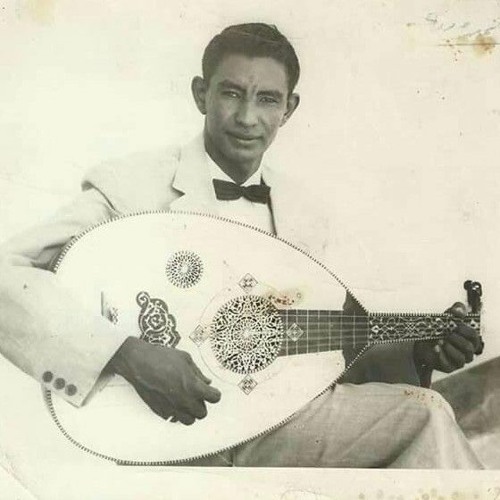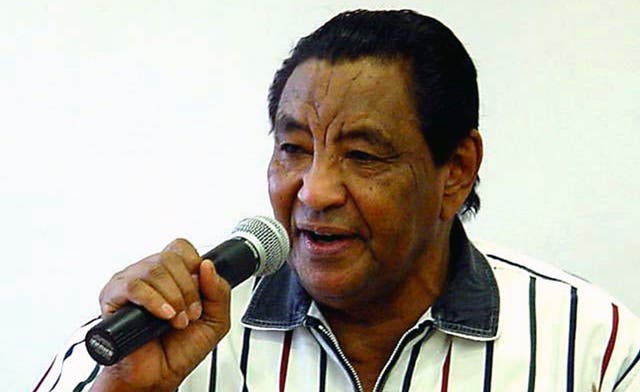Mohammed Wardi - 1997 - Al-Marsal
Mohammed Wardi was a Sudanese singer who has been defined as "The Pharaoh", "The Emperor", "The Legend”, “The Last King of the Nubians”, “The Sudanese Golden Ugola” and among the best African singers.
Everything start from 19 July 1932, when in a small ethnic Nubian village called Sawarda (near Wadi Halfa, a stone's throw from Nile and from the border with Egypt) Mohammed Wardi was born. July 19 is a very particular day in his life because it comes back and back as we go. The first time he recorded a song on the radio was July 19, 1957. When the military coup of July 19, 1971, occurred, he spent his longest time in detention. So it's always [the number] 19 for him.
Orphaned at nine, and abandoning an already stable career as a music teacher at just over twenty, Wardi threw himself into the frenetic Khartoum of the 1950s, a city that had recently become the capital of Sudan independent from Great Britain and Egypt (1956 ). Mohammed, self-taught, then began singing on the radio, in particular on the Huna Omdurman station, created by the English in the 1940s but gradually transformed into a "national" Sudanese radio. It will be one success after another: making use of collaborations with the greatest Sudanese and non-Sudanese poets (here is a list), Wardi will become one of the most influential and representative singers and activists of his country's dynamic music scene.
Wardi's story is of particular interest to us because it is inextricably linked to his political activism and, in general, to the recent history of Sudan.
In 1958, after only two years of independence, General Ibrahim Abboud came to power in a coup. Among the successes of Wardi, a staunch opponent of Abboud, we find the song Uktubir Akhdar ("Green October"), dedicated to the strength of the people who can "bring down the prison walls", exactly what happened in October 1964 during the riots people who swept away the coup general and inaugurated a civilian government. From that October the Uktubiriyaat ("the October ones") were born, poems and songs aimed at telling and celebrating the events of that year. Finally, Asbah al-Subh ("The morning has come", here a legendary live performance), Wardi's song dedicated in particular to the students who opposed Abboud, also belongs to that period. When he sang to Ibrahim Abboud, a former president of Sudan, it was during a military coup. He thought the military loved their country because they didn't have political parties, they didn't just talk a lot and not do much. They were military, they had order, they had discipline. So he sang for these people, but the first political clash that came with them was when they drowned Halfa, when Sudan let Egypt build the dam that drowned the city we come from.
After that, became more conscious, and more aligned with the political left. To be more specific, he was in the Sudanese Communist Party (the largest in Africa during the Cold War). That was in the '60s, he was part of the opposition to remove colonization. They were very close to the youth and their voice was the loudest.
In 1969, Sudan experienced another coup, this time orchestrated by General Ja‘far al-Nimeyri. If in the beginning Wardi supported the latter's "socialist" policies, he later changed his mind when faced with the ferocious repression of dissidents (including himself, imprisoned), with laws that limited freedom of expression, producing, among other things, the resulting decline of the music industry. In a first self-imposed exile, he performed some songs such as Banadeeha (“I am calling her”) in which he criticized al-Nimeyri and, with songs such as Ya Sha'aban Lahabak Thouritak (“O People, your revolution has caught fire”) and today's song Hanabnīhu ("We will build it!"), supported the popular protest movement that would lead to a new civilian government in 1985.
Milestones from that period are such as al-Marsal (“The Messenger”), Balad Rayeh (“The country is lost”) and above all Sallim Mafateeh Al Balad (“Give us the keys to the country”), which has become famous again, like many of his others. songs, in "updated" versions (like that of the artist Zoozita) and loudly taken up during the most recent protests. In 1994, Wardi won a prize that anointed him the best singer in Africa.
Mohammed Wardi, like music in Sudan, is a treasure to be discovered: we have not exposed his songs in Nubian, those for Sudanese unity, those dedicated to the Sudanese diaspora, those against all sorts of racism and the dozens of songs of 'Love. We have not talked about some legendary moments, such as his concert in front of thousands of Sudanese refugees in the refugee camp of Itang (Ethiopia) in 1990, about that fan who came on foot from Mali to ask him for an autograph for which he paid for the return flight and of his triumphal return to Sudan in 2002.
Here a nice interview to Mohammed Wardi's son: https://www.okayafrica.com/mohammed-wardi-sudan-last-king-nubia/
(https://www.oasiscenter.eu/it/tarab-mohammed-wardi-ricchezza-musica-sudanese)
TRACKLIST:
A1 جمال الدنيا
Lyrics By – كمال محيسي
A2 الهوى الأول
Lyrics By – الجيلي عبد المنعم
A3 حنينة
Lyrics By – إسماعيل حسن
B1 غلطة
Lyrics By – إسماعيل حسن
B2 صدفة
Lyrics By – إسماعيل حسن
B3 المرسال
Lyrics By – محمد علي أبو قطاطي
Recording Studio: Al Araby Music Studio
Credits:
Accordion: الزين مبارك
Bass Guitar: حامد موسى
Guitar: كميليو, محمد سليمان
Keyboards: عمر عويس
Percussion: جعفر حرقل
Saxophone: حامد عثمان
Strings: مجدي العاقب, محمدية, ميكائيل الضو
Trumpet: سراج
Composed By – محمد وردي
Arranged By – محمد وردي
Design – هاشم ودراوي









https://tinyurl.com/2rxscz2k
ReplyDelete